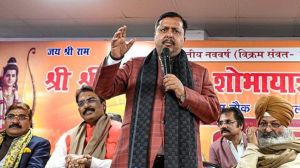New Asian order
Now that the Army has regained control of Kargil, India must consider its diplomatic options for the future. A look over the shoulder int...

Now that the Army has regained control of Kargil, India must consider its diplomatic options for the future. A look over the shoulder into our own backyard would not hurt either, but external affairs obviously enjoys primacy at this point. The talks between Jaswant Singh and Medeleine Albright, and the promise of a Clinton visit after the elections show the way to a more reasonable future than was ever expected, but euphoria holds its own dangers. The talk of India emerging as a stabilising force in Asia, which is entirely believable, is already leading to incredible predictions of India balancing out the whole world. In managing its new relationships, India should show the same maturity that marked its action in Kargil. Friendship8217; is only the rhetoric of diplomacy. In the real world, it maps to a word with a very different emotional value: expediency. We should not mistake US overtures, however beneficial to us, for friendship. What they indicate is not a community of spirit but a community of interest,which should be leveraged intelligently to our advantage. True, the rhetoric of anti-Americanism is out of date, but it would pay to bear in mind that it did not spring into existence ex nihilo. It was a reaction to decades of anti-Indianism in Washington, which actually framed laws to continue arming Pakistan.
India is indeed grateful that the US is taking a more ethical position now. But we should not have to pay the customary price for ignoring history. To go completely pro-American would be a bit like getting gooey about Indira Gandhi in 1984 because she was concerned about the terror in Punjab. The US was part of the Pakistan problem. It is only fitting that it should be part of the solution. To some extent, India8217;s current predicament is also familiar territory to the US. A nuclear threat, an attempt at a proxy war, the limits of restraint tested and the real aggressor unmasked. All the ingredients of John F. Kennedy8217;s public speeches were directed at the USSR during the Cuban missile crisis.While it may be fanciful to attribute the American change of position to this parallel, there is another in the Islamist threat. Washington8217;s creature of the Afghan conflict is now out of control and threatens both India and the US. Similarly, China does not want trouble in its Muslim-majority provinces any more than India wants militants in Kashmir. However, India should appreciate that common ground need not last for ever. It must certainly change its foreign policy in response to the new climate, but it must remember that weather is a notoriously fickle phenomenon.
Back home, the issue of failures 8212; whether of intelligence or implementation 8212; leading to the intrusion has to be resolved, because it will hold important lessons for the future security of the country. The government has taken the least adequate option in this matter, a review panel that does not even have the right to call for documents. It is easy to appreciate the compulsions of a government facing the polls, but this is an issue thattouches the national interest. In the absence of commitment and transparency, there will be more accusations like that of Lt Gen Retd Moti Dar, who has alleged a failure of both the military and the civilian leadership.
- 01
- 02
- 03
- 04
- 05































